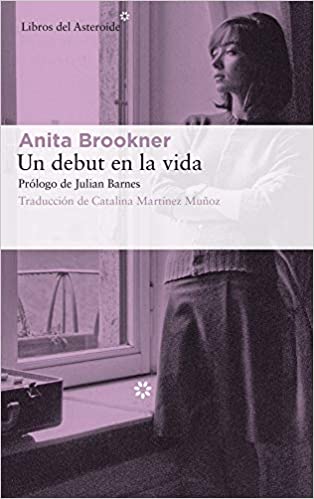It cannot be said that writing occupied the creative spirit of Anita brookner. Because its first publication was over fifty years old. But as I have commented many times, one may not know that he is a writer until he finds himself sitting in front of a story of x pages. I remember cases as late as brilliant as louis landero o Frank McCourt who began to write well past 40 in the first case or beyond 60 in the second ...
The point is that in the case of Anita, other creative pursuits lulled the writer in favor of a training in art and a devotion to the pictorial that placed her as an authority in Art History and in various painters and styles.
But in literature you can also extend brushes to outline those mosaics full of life, with their gazes that pierce the observer, in this case the reader, or scenes more vivid even than the most realistic of paintings. Because the imagination also paints the fleeting scenes that literature provides. And that's how Anita began to narrate like someone who covers canvases to make white the most beautiful transformation that reason, imagination and the gift of creativity as a pulse can carry out.
Anita Brookner's Top 3 Recommended Novels
Short lives
Short lives tells the story of Fay, of her discreet joys and illusions since, in the XNUMXs, she abandoned her modest singing career for a marriage far removed from the romanticism preached by the songs and movies of the time. A life in search of love and true affections in which an extravagant woman, the glamorous and self-centered Julia, ends up becoming a subtle but constant influence. Already in maturity, in a new world that seems to have left them behind, the ties that unite Fay and Julia are not those of the unspeakable secret that they hide, nor those of the shared hours, but rather those of the fear of loneliness.
A masterful exercise of elegance and delicacy, full of irony, about the commitments we make with others and with the decisions we make over the years. Anita Brookner, winner of the Booker Prize and one of the great British writers of the late twentieth century, achieved with Short lives one of his best novels, a delicate portrait of lives marked by nostalgia and repressed emotions.
A debut in life
«At forty years old, Dr. Weiss understood that literature had destroyed her life.» Ruth Weiss is an intelligent and lonely university professor who has specialized in Balzac's female characters, in which she tries to see reflections of her own life.
Raised in London in the bosom of a somewhat eccentric family - the only daughter of a theater actress a bit hypochondriac and an old bibliophile and bookseller with very little talent for commerce - her precocious love of literature led her to think that in the great novels you could find the true measure of the world. But now, when she looks back, to her childhood in London and her university years in Paris, she thinks that, in fact, maybe she was wrong.
The first novel by Anita Brookner - one of the great British writers of the late twentieth century - is a lucid, ironic and tender tale about the contradiction between the aspirations of a young woman enraptured by literature and a life that tends to be more prosaic than what we imagine.
"With an underground and indefatigable irony, […] Brookner envelops us in the psychological climate of misplaced heroines, absurdly meticulous, of moderate sensuality, in the midst of crisis and hopelessly waiting for some kind of change in their lives."Lourdes Ventura (The Cultural)
A Sunday in Ville-d'Avray
A woman visits her older sister in Ville-d'Avray, a quiet residential area on the outskirts of Paris. Their lives have followed very different paths and they have lost the complicity of their childhood, but that Sunday evening, in the garden, confidences will reappear unexpectedly; her sister will tell her of the brief and disturbing relationship she had with a stranger, still present in her thoughts despite the years that have passed. This intense and delicate novel tells us about the need for adventure within a monotonous existence and explores the unspeakable longings and secrets that make us unknown to others and even to ourselves: «Who really knows us? We count so few things, and we lie about almost everything. Who knows the truth?
With the veiled memories and silences of that conversation full of chiaroscuro, in an enveloping and disturbing atmosphere, Barbéris subtly explores the imperceptible uneasiness of a life without emotions in this little literary gem that has been a finalist for the prestigious Goncourt and Femina awards.



